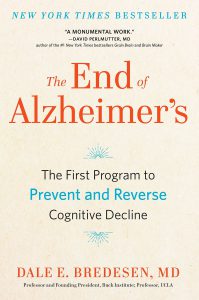Last week we shared an article about how to boost your cognitive health using nutrition. Click here to read that post: Guide To Boosting Your Cognitive Health Part 1: Nutrition
Whether you yourself are suffering, your loved one is struggling, or you are an advocate of healthy living- you will want to take note of the tips offered in this guide.
This guide is based on Dr. Bredesen’s #1 Bestseller, The End of Alzheimer’s: The First Program to Prevent and Reverse Cognitive Decline, His substantial work in the field of reversing cognitive decline is instrumental for anyone suffering from this themselves or supporting a loved one going through this process.
Here are some great tips that would truly benefit all of us, especially those of you who are trying to find the right protocol to support your brain health.
1) Exercise
5-6 times per week for 30-60 minutes, raising heart rate and including both cardiovascular and strength training exercises. Exercise increases brain-derived neurotrophic factor (BDNF), which has important anti-Alzheimer’s effects. It also helps to improve oxygenation, improve sleep, reduce overall stress, reduce fat and associated adipokines, improve insulin sensitivity, and improve overall brain and body physiology in numerous ways. Exercise is one of the best ways to prevent cognitive decline, and is an important part of the protocol to reverse cognitive decline.
2) Sleep
Sleep has multiple mechanisms to reduce cognitive decline. For example, it induces melatonin, which reduces the amyloid-beta associated with Alzheimer’s disease. Also, it is critical to memory consolidation and it alters cellular anatomy to foster the removal of abnormal and toxic species from the brain. Thus, sleep has multiple mechanisms to support the reversal of cognitive decline.
Most people have a sleep debt, due to chronic lack of optimal sleep, both in quantity and quality. It is crucial to ensure that you do not have sleep apnea. If you do have sleep apnea, it is very important to treat it whether by CPAP, oral device, altering sleeping position, or other methods.
Melatonin:
It can be helpful to use melatonin at bedtime. A physiological dose is 0.5mg, which can be taken by mouth or sublingually, depending on formulation. Some take higher doses, up to 20mg, and it is a relatively benign supplement, so you can adjust your dose.
If the dose is too high, you may notice that you awaken after about three hours of heavy sleep, and you may feel sluggish the next morning. If the dose is right, you should notice increased dreaming and awaken feeling refreshed. Melatonin has many effects, among them reducing amyloid-beta, reducing reactive oxygen species, and tumor suppression.
If you find that you are awakening in the middle of the night and ruminating, unable to return to sleep, you may find that Tryptophan (500mg) or 5-hydroxytryptophan (100 mg) helps to prevent this. Please discuss this with your practitioner, especially if you are on an SSRI (selective serotonin reuptake inhibitor) for depression, or a related SNRI (serotonin and norepinephrine reuptake inhibitor).
Helpful Sleep Tips:
In order to optimize cognition, try to get as close to 8 hours of sleep each night as possible. It is best to go to bed before midnight, although some people find that their circadian rhythms do not allow this. It is also best to make sure that the room is as dark as possible. Many people like to use an eye mask for this purpose or blackout curtains. In addition, have your bedroom be as quiet as possible and free of EMFs. I’ve found Airestech to be a reliable company with affordable options for EMF protection- use code onnalomd10 for 10% off! Lastly, wind down in the evening instead of exercising or working right up until bedtime.
3) Reduce Stress
Stress is one of the most important contributors to cognitive decline, and stress-related molecules such as cortisol and corticotropin releasing factor receptor 1 are mediators of neural cell death and cognitive decline. Therefore, an important part of the overall program is to reduce stress-related effects, and there are many ways to do this, so please choose the ones that you enjoy.
Relaxation Ideas:
Some people choose meditation, and indeed meditation has a positive effect on cognition. Others love music, walks in the park, yoga, visiting museums, lovemaking, or many other things (or all of those things). The Neural Agility recording, designed for brain neurophysiology, is “meditation on steroids,” and many enjoy that. This should be done 5 times per week, in the evenings, for 30 minutes, relaxed and lying down with the lights down. Finding joy and relaxation in life is very important to reduce the brain-damaging stress that many of us feel in our busy lives.
4) Mental Exercise
There are many ways to do mental exercises. Try Posit, Dakim, Lumosity, learn a new language, do Sudoku, or crossword puzzles, etc. The key is to do these in the presence of improved biochemistry. Do not do these exercises to the point of exhaustion. A typical session is 40-60 minutes for 4 or 5 times each week. If you are new to this habit, it is ok to start with shorter sessions and increase the duration with time. Remember, some mental exercise is better than none at all. Make it a priority to stay mentally active. In essence, you “use it or lose it.”
5) Auditory Physiology
This is like “meditation on steroids.” Use with headphones and listen from your phone, iPod or computer in the evening. It is ideal to practice this 5 times per week, for 30 minutes each time. Rest as you lay down on your back in a dark room and relax. These specialized tones can affect the release of powerful brain chemicals that can regulate mood, improve sleep, and reduce aggression as well as depression. Listen here: http://www.fariastechnique.com/music-for-interhemispheric-synchronization and Dr. Bredesen recommended this program : http://www.activemindsglobal.com/products/revita-mind/
6) Hygiene
Dr. Kenneth Seaton from Australia spent his career studying the relationship between hygiene, inflammation, and cognition. One of the measures he used to gauge inflammation was the albumin-to-globulin (A/G) ratio. Albumin is an important protein to remove amyloid, and to carry many other molecules (including drugs and hormones) in the blood. When inflammation occurs, from bacteria, fungi, viruses, harmful microbes or dietary inflammagens (like trans fats or simple carbohydrates) the globulin fraction (from which antibodies are derived) increases at the expense of the albumin fraction. This reduces the A/G ratio. This is associated with reduced cognition.
Hygiene, and the maintenance of intact barriers (gut lining, blood-brain barrier, oral, nasal, integumentary (skin, nails, hair), etc.), play a key role in optimizing the A/G ratio. Oral hygiene with an electric toothbrush, floss, and a water-pressure flosser are all important. Oral microbes have been identified repeatedly in the brain in Alzheimer’s disease. Some like to use nasal washes, as well. Evaluation for MARCoNS (multiple antibiotic resistant coagulase-negative Staphylococcus) is helpful, especially in anyone with type 3 (toxic) Alzheimer’s disease. Furthermore, ensuring good nail and skin hygiene can be helpful.
In Summary
Your Cognitive Health Is Worth The Investment. In essence physical and mental exercise, sleep, relaxation, auditory physiology, and hygiene are all important factors to consider when supporting your brain health. All six of these lifestyle tips will help to optimize your physical and mental wellbeing. We hope that this information is useful for you on your journey for the best cognitive health. If you’d like personal support in this process please click here to learn more about our Happy Health Brain Longevity Program. Also, be sure to check out our entire series on cognitive health by clicking the links below:
Guide To Boosting Your Cognitive Health Part 1: Nutrition
Guide To Boosting Your Cognitive Health Part 2: Lifestyle Tips
Guide To Boosting Your Cognitive Health Part 3: Kirtan Kriya
Guide To Boosting Your Cognitive Health Part 4: The Ketogenic Diet
Guide To Boosting Your Cognitive Health Part 5: Is your blood sugar affecting your brain?
PS: You are invited to click here to sign up for our free 14 Days to Health Video Series and to join our Facebook group for personal support: The Happy Health Community.
To learn more on this topic please reference our resources below:
Book: The End of Alzheimer’s: The First Program to Prevent and Reverse Cognitive Decline by Dale Bredesen, MD
Website + Research: https://www.drbredesen.com/thebredesenprotocol















